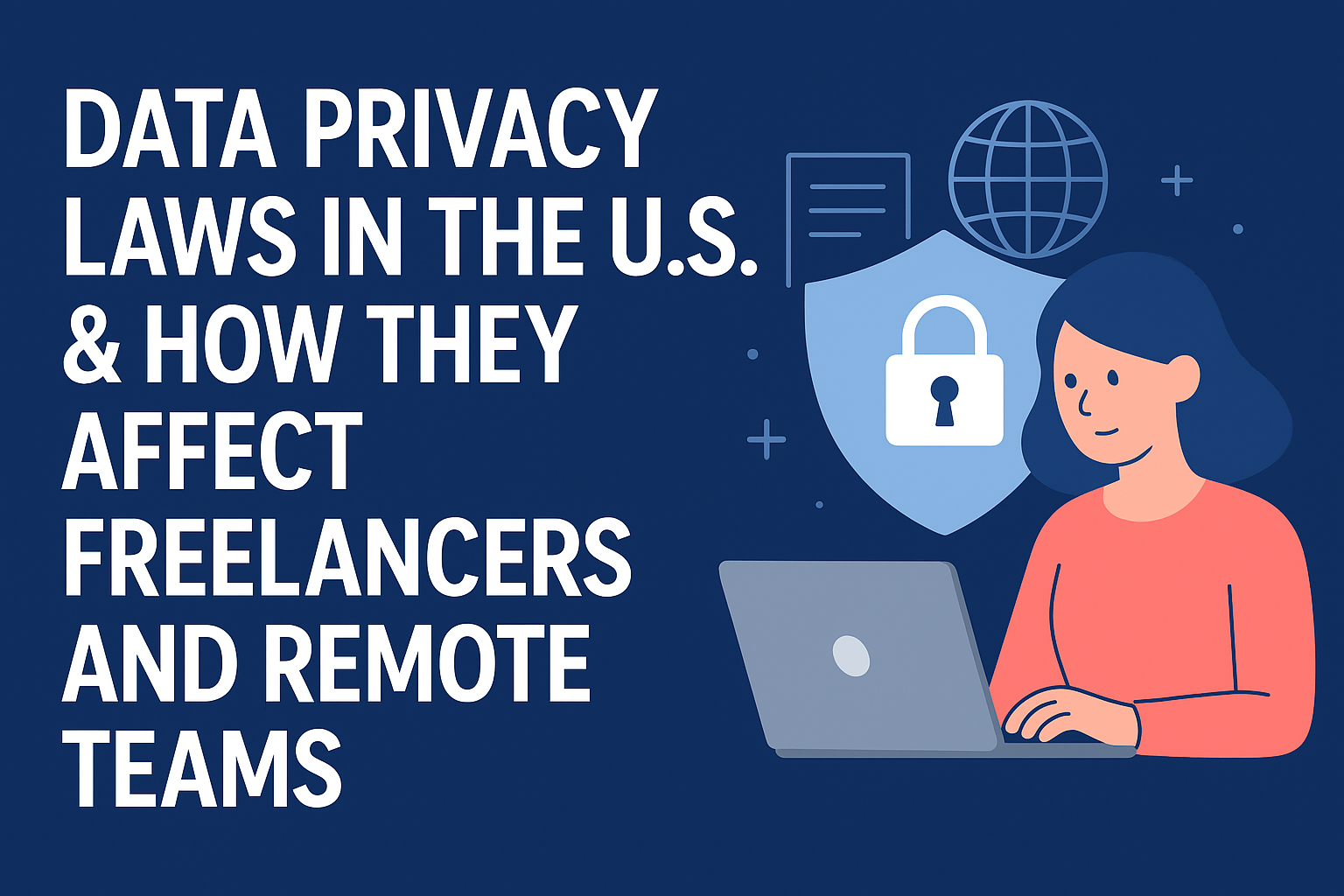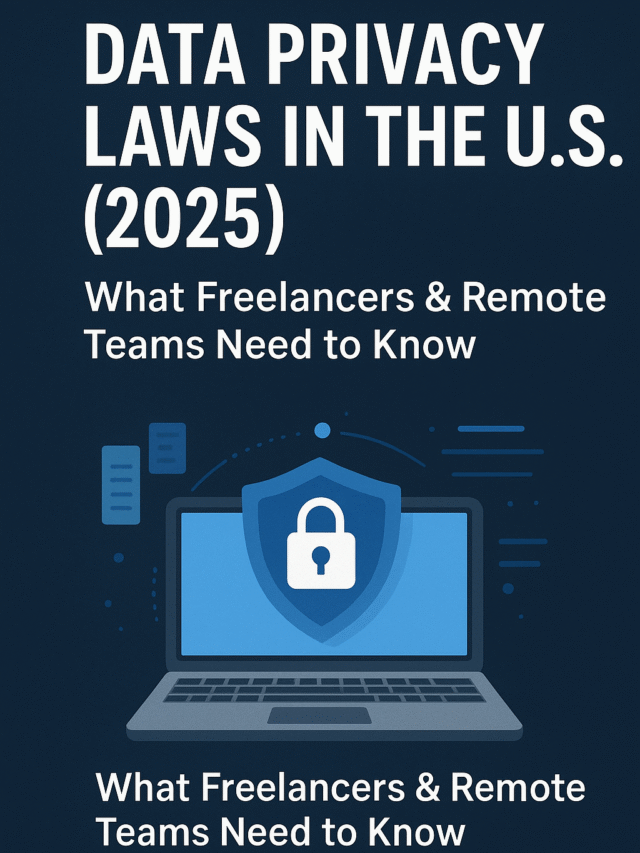
Table of Contents
As remote work and freelancing continue to reshape the modern workforce, one crucial question keeps coming up: How do state privacy laws in the U.S affect freelancers and remote teams?
Whether you’re a freelance designer handling client files or a remote project manager working with global data, understanding U.S. data privacy laws isn’t optional — it’s essential for protecting both your clients and your career.
Understanding Data Privacy Laws in the U.S.
Unlike Europe’s GDPR, the United States does not have one single, federal data privacy law. Instead, it relies on a complex mix of state-level privacy laws and industry-specific regulations that dictate how personal data can be collected, stored, and shared.
For freelancers and remote teams, this patchwork system can be confusing — especially if your clients are in different states with different rules.
Some of the key data privacy laws in the U.S you should know include:
- California Consumer Privacy Act (CCPA/CPRA): Gives California residents rights to know, delete, and restrict how their data is used.
(Learn more: State of California Department of Justice – CCPA) - Virginia Consumer Data Protection Act (VCDPA): Regulates how personal data is processed by businesses operating in Virginia.
- Colorado Privacy Act (CPA): Applies to companies that handle large amounts of user data or sell personal information.
These laws have inspired similar legislation in other states like Connecticut, Utah, and Texas — and more are coming in 2025, according to White & Case.
Why Data Privacy Laws in the U.S Matter for Freelancers and Remote Teams
Freelancers and remote workers often handle sensitive information — client names, invoices, payment details, creative files, or even user data. Under data privacy laws in the U.S , that makes you a data processor or controller, depending on how you use the data.
Here’s why it matters:
- Legal Responsibility: Even if you’re a small freelancer, you could still face fines or penalties if client data is misused or leaked.
- Client Trust: Data privacy compliance can be a selling point in your proposals. Clients prefer freelancers who take data protection seriously.
- Cross-State Risks: If your client is in California but you’re based in Texas, you might still have to comply with California’s CCPA rules.
Simply put — data privacy laws in the U.S affect freelancers and remote teams more than ever because remote collaboration blurs the line between personal and corporate data handling.
How U.S Data Privacy Laws For Freelancers Impact Day-to-Day Freelancing
Let’s break down how data privacy compliance shows up in daily freelance or remote work:
1. Data Collection
You might collect client names, emails, and project details. Under U.S. data privacy laws, you must inform clients how you use their data and keep it secure.
2. Data Storage
Storing client files in unsecured cloud drives can violate privacy standards. Always use encrypted file-sharing tools such as Proton Drive or Tresorit, which comply with data protection principles.
3. Data Sharing
If you subcontract work or share client data with other freelancers, ensure there’s a written agreement outlining privacy responsibilities. Mismanaging client information could make you liable under state laws.
4. Remote Work Security
Using personal devices for work? Then you must secure them. Tools like Bitwarden or NordPass can help protect logins, while Surfshark VPN encrypts your online connection — crucial for remote teams accessing client data from shared networks.
(Check out Surfshark — it’s affordable and privacy-focused, ideal for freelancers.)
State Privacy Laws in the U.S :Freelancers Should Watch in 2025
By 2025, at least eight U.S. states will enforce new or updated privacy laws. This means freelancers and small remote teams must stay proactive.
A few examples:
- Texas Data Privacy and Security Act (TDPSA) – effective July 2024, covering most digital businesses operating with Texas residents.
- Montana Consumer Data Privacy Act (MCDPA) – going live October 2024.
- Oregon Consumer Privacy Act (OCPA) – effective July 2024.
These laws grant users more control over personal data, while increasing compliance demands on businesses — including freelancers handling that data. For a complete overview, visit ICLG: Data Protection Laws USA.
Practical Data Privacy Tips for Freelancers and Remote Teams
To stay compliant and protect yourself, follow these best practices:
✅ 1. Use Secure Tools
Avoid using unverified platforms for client communication or file sharing. Choose encrypted services like Signal, Proton Mail, or Google Workspace Business Plus for added protection.
✅ 2. Update Your Contracts
Include a data processing clause in all freelance agreements. It should define how client data is handled, stored, and deleted after project completion.
✅ 3. Implement Strong Cybersecurity Habits
Use multi-factor authentication, regularly update passwords, and avoid public Wi-Fi without a VPN. Many privacy breaches start with simple human error.
✅ 4. Stay Informed About State Laws
Follow updates on FTC.gov and Privacy Rights Clearinghouse to keep up with U.S. data privacy laws that could affect how you manage client information.
✅ 5. Respect Client Data
Delete old project files once contracts end, unless clients request otherwise. Keeping unnecessary data can increase your liability if your systems are ever compromised.
The Bigger Picture: Building Trust in the Remote Economy
Freelancers and remote teams are now an integral part of the U.S. economy. As client expectations rise, understanding data privacy laws in the U.S can help you stand out.
When you demonstrate that you value privacy — by using encrypted tools, following best practices, and being transparent with clients — you’re not just complying with the law; you’re building trust, which leads to more referrals and repeat business.
Conclusion: Why Data Privacy Compliance for remote teams matter more Than Ever
In 2025 and beyond, data privacy laws in the U.S will continue to expand, and they’ll directly affect how freelancers and remote teams operate.
By understanding these laws and applying privacy-first practices, you can protect your business, your clients, and your reputation.
Remember — compliance isn’t just about avoiding fines. It’s about showing professionalism in a digital world where trust is the ultimate currency.
💡 Take Action Now
Secure your remote workflow today with privacy-focused tools like Surfshark VPN, Proton Mail, and Bitwarden.
These small steps can make a big difference in staying compliant with data privacy laws in the U.S — and keeping your freelance business safe.
Check out my recent blog : Machine Identities: The Hidden Risk in Your Cloud & AI Workflows


Pingback: Deepfakes and Social Engineering: Protect Your Personal Brand as a Freelancer (2025 Guide)